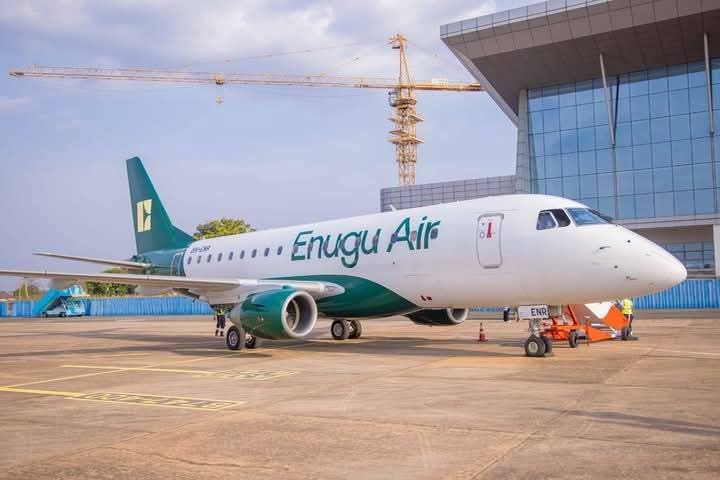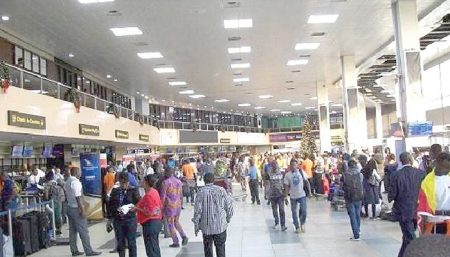Paragraph 1: The Launch of Enugu Air and Optimism from Airport Authorities
The arrival of an aircraft bearing the inscription "Enugu Air" at Akanu Ibiam International Airport (AIIA) in Enugu, Nigeria, has sparked debate within the aviation industry. Hilary Umunna, the Regional Manager of South East Airports and Manager of AIIA, expressed enthusiasm about the new airline, projecting a significant boost in passenger traffic and revenue generation for both the state and the Federal Airports Authority of Nigeria (FAAN). Umunna cited potential positive ripple effects for the South-East region, encompassing trade, tourism, and business growth, aligning with FAAN’s goal of establishing Enugu as a strategic aviation hub. He highlighted AIIA’s efforts to meet International Civil Aviation Organisation (ICAO) standards, including infrastructure upgrades, improved ground handling, enhanced security, and compliance with international safety protocols, all to ensure seamless operations for Enugu Air.
Paragraph 2: Industry Experts Express Skepticism and Caution
Contrary to Umunna’s optimism, industry experts have voiced skepticism about the viability of Enugu Air and the rationale behind its establishment. Captain John Okakpu, a seasoned commercial pilot with over three decades of experience, cautioned against impulsive ventures, emphasizing the importance of thorough feasibility studies before launching an airline. He argued that only Lagos State Airport, with its high passenger volume and flight frequency, could justify the development of additional airports, not necessarily airlines. Okakpu pointed to the relatively low passenger traffic in regional airports like Asaba, Umuri, Owerri, and potentially Ebonyi, questioning the market share Enugu Air could realistically capture in such a competitive landscape. He further emphasized the overall struggle of Nigerian airports to reach projected passenger numbers, highlighting the discrepancy between national air traffic and that of other countries with similar populations.
Paragraph 3: Concerns about Market Saturation and Passenger Demand
Okakpu’s concerns extend to the broader issue of market saturation within the Nigerian aviation industry. He questioned the need for another airline in a region already served by existing carriers and airports, emphasizing the limited passenger base. He cautioned against blindly increasing the number of airlines and airports without a corresponding surge in passenger traffic. Using Ogun State Airport as an example, he warned against repeating the mistakes of Ekiti and Osun states, where airport projects have faced challenges. His advice underscores the need for a data-driven approach to airport and airline development, prioritizing passenger demand and market analysis.
Paragraph 4: Criticism of Alleged Ill-Planning and Misplaced Priorities
Retired Chief Pilot Capt. Mohammed Badamosi echoed the concerns about the viability of Enugu Air, criticizing the state government for what he perceived as an ill-conceived venture driven by increased federal allocations. He questioned the allocation of resources to an airline when other pressing developmental needs could be prioritized. Badamosi suggested that the government might have been swayed by consultants who conducted feasibility studies aligned with the government’s desires, rather than providing objective assessments. He also raised the issue of potential abandonment of the project after the current administration leaves office, citing similar instances of unfinished government projects.
Paragraph 5: The Role of Stakeholders and the Need for Informed Decision-Making
Badamosi also lamented the apparent lack of engagement with aviation stakeholders within the state, questioning why their voices were not incorporated into the decision-making process. He attributed the pursuit of such ventures to a combination of factors, including potential ulterior motives, a lack of understanding of the aviation industry’s complexities, and a general lack of informed decision-making. His remarks underscore the importance of transparency, consultation, and expert input when embarking on significant projects like launching a new airline.
Paragraph 6: A Call for Prudence and Realistic Assessment
The differing perspectives on Enugu Air highlight the complex challenges facing the Nigerian aviation industry. While airport authorities see the new airline as a potential catalyst for economic growth and regional connectivity, industry experts caution against unrealistic expectations and urge a more measured approach. The debate underscores the need for rigorous feasibility studies, careful market analysis, and transparent engagement with stakeholders to ensure that aviation projects are sustainable and contribute meaningfully to the long-term development of the sector. The experience of Enugu Air will likely serve as a case study for future airline ventures in Nigeria, emphasizing the importance of aligning ambition with practical realities and market demands.














